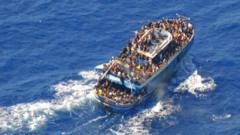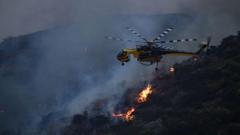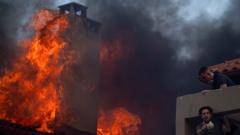The Greek coastguard has been implicated in the deadliest migrant boat disaster in a decade, with 17 members facing criminal charges. Survivors accuse the coastguard of causing the ship to capsize in a failed rescue attempt, sparking an investigation into the incident and raising concerns over the handling of migrant safety by Greek authorities.
Greek Coastguards Face Charges Over Tragic Migrant Shipwreck

Greek Coastguards Face Charges Over Tragic Migrant Shipwreck
17 members of the Hellenic Coast Guard are charged in relation to the deadly June 2023 migrant boat disaster, which led to the drowning of hundreds of people.
In a significant development regarding the tragic migrant boat disaster near Pylos, Greece, a naval court has charged 17 members of the Hellenic Coast Guard, following the incident that occurred on June 14, 2023. The overcrowded Adriana fishing vessel, which set sail from Libya with approximately 750 people onboard, capsized in the Mediterranean Sea, leading to estimates of 650 presumed dead.
Survivors of the maritime catastrophe have made serious allegations against the Greek coastguards, claiming their actions led to the boat’s sinking during a failed towing attempt. "It has taken us two years just for these charges to come, even though so many people witnessed what happened," expressed Ahmad, a survivor from Syria. For their part, Greek authorities have consistently denied wrongdoing.
The charges against the coastguards were initiated by the Deputy Prosecutor of the Piraeus Naval Court, who found sufficient grounds to pursue criminal action against those involved. Among those charged is the captain of the coastguard ship, designated LS-920, accused of "causing a shipwreck" which led to the confirmed deaths of at least 82 individuals. This number reflects the bodies recovered; however, it is believed that up to 500 people, including vulnerable groups, may have perished.
The disaster unfolded in international waters that correspond to Greek rescue jurisdiction. Other officials, including the Chief of the Coast Guard and the Supervisor of the National Search and Rescue Coordination Centre, have also been charged with exposing others to danger, in a move highlighting the systemic issues surrounding migrant safety in Greek waters.
Compelling evidence suggests that the coastguard ship had been tracking the Adriana for around 15 hours prior to its sinking. Investigations led to claims disputing the official narrative that the boat was not in distress, which previously informed Greek authorities' decision to withhold rescue efforts. Audio recordings and testimonies from survivors have further intensified scrutiny on the coastguards, revealing potentially coercive practices to silence witnesses.
Syrian refugees Ahmad and Musaab, who paid $4,500 each for their passage, recounted harrowing experiences from the day of the disaster. Ahmad lamented the loss of his younger brother and described how the migration vessel capsized after the coastguard vessel hastily released its tow, stating that survivors were silenced when they attempted to assert that the coastguard was responsible for the tragic event.
Although the legal representative for the survivors hailed the prosecution of coastguard members as a positive step towards justice, skepticism remains regarding the effectiveness of the legal system in holding authorities accountable. They emphasized this moment as a critical pivot in the quest for justice for those affected by the deadly shipwreck.
As the accused coastguards prepare for judicial proceedings in the coming weeks, numerous questions remain about potential penalties and the broader implications for Greece's approach to migrant safety amidst a continuing humanitarian crisis.























